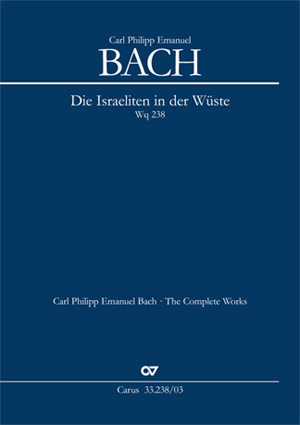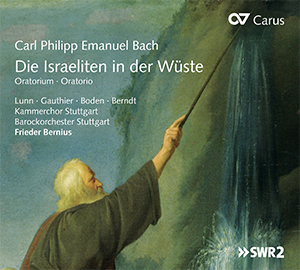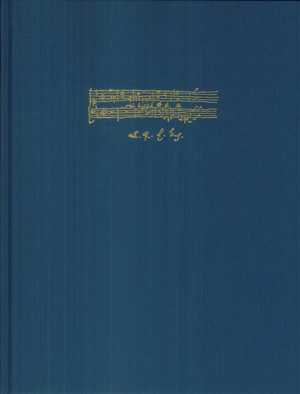
Carl Philipp Emanuel Bach The Israelites in the Wilderness
Oratorio BR-CPEB D 1 (Wq 238), 1769
- Scoring:
- Soli SSTB, Coro SATB, 2 Fl, 2 Ob, Fg, 2 Cor, 3 Tr, Timp, 2 Vl, Va, Bc
- Search for works with similar scoring
- Language:
- German
- Duration:
- 75 min
- Difficulty level:
- 1 2 3 4 5
 Listen
(29)
Listen
(29)
- Purchase the work as a CD or download.
- Erster Teil. Chor der Israeliten: Die Zunge klebt am dürren Gaum
- Rezitativ Erste Israelitin: Ist dieses Abrams Gott?
- Arie Erste Israelitin: Will er, dass sein Volk verderbe?
- Accompagnement Aaron: Verehrt des Ew'gen Willen
- Arie Aaron: Bis hieher hat er euch gebracht
- Rezitativ Zweite Israelitin: Warum verließen wir Ägyptens blühend Land
- Arie Zweite Israelitin: O, bringet uns zu jenen Mauren
- Rezitativ Aaron: Für euch fleht Moses stets um neue Huld
- Symphonie
- Rezitativ Moses: Welch ein Geschrei tönt in mein Ohr?
- Chor der Israeliten: Du bist der Ursprung unsrer Not
- Rezitativ Moses: Undankbar Volk, hast du die Werke
- Duett Erste & Zweite Israelitin: Umsonst sind unsre Zähren
- Accompagnement Moses/Chor der Israeliten: Gott, meiner Väter Gott
- Arie Moses: Gott, sieh dein Volk im Staube liegen!
- Chor der Israeliten: O Wunder! Gott hat uns erhört!
- Zweiter Teil. Rezitativ Moses: Verdienet habt ihr ihn
- Arie Moses/Erste Israelitin: Gott Israels, empfange im jauchzenden Gesange
- Tutti Chor/Zweite Israelitin: Gott Israels, empfange der Herzen heißen Dank!
- Rezitativ Erste Israelitin: Wie nah war uns der Tod!
- Arie Erste Israelitin: Vor des Mittags heißen Strahlen
- Accompagnement Moses: O Freunde, Kinder, mein Gebet
- Rezitativ Zweite Israelitin: Beneidenswert, die ihren Sohn ihn nennt!
- Arie Zweite Israelitin: O selig, wem der Herr gewähret
- Rezitativ Moses: Hofft auf den Ew’gen
- Chor: Verheißner Gottes
- Choral: Was der alten Väter Schar
- Accompagnement Tenor: O Heil der Welt
- Chor: Lass dein Wort, das uns erschallt
 Additional material
Additional material
- Purchase additional material as a download product.
-
 text (without music) for download, html file, Singing text, originalhtml file, Singing text, original (Sample)
text (without music) for download, html file, Singing text, originalhtml file, Singing text, original (Sample)Erster Teil
1. Chor der Israeliten
Die Zunge klebt am dürren Gaum,
wir atmen kaum.
Rings um uns her ist Grab.
Gott, du erhörst des Jammers Klage nicht,
Gott, du kehrst dein Antlitz von uns ab.2. Rezitativ Erste Israelitin
Ist dieses Abrams Gott?
Der Gott, der bei sich selbst geschworen,
das Volk, das er sich auserkoren,
nie zu vergessen, zu verlassen?
Wir schmachten, wir erblassen.
Wir haben keinen Trank
als diese Tränen, die wir weinen.
Der Herr hat Lust an unserm Untergang,
und er gedenkt nicht mehr der Seinen.3. Arie Erste Israelitin
Will er, dass sein Volk verderbe?
Sind wir länger nicht sein Erbe?
... -
 text (without music) for download, html file, Introductory text, Englishhtml file, Introductory text, English (Sample)
text (without music) for download, html file, Introductory text, Englishhtml file, Introductory text, English (Sample)Text from the CD Carus 83.292
Wolfram Enßlin
Translation: David KosvinerWith the oratorio Die Israeliten in der Wüste, which was premiered on 1 November 1769, Carl Philipp Emanuel Bach presented a sacred vocal work accompanied by orchestra that was completely his own to the Hamburg audience for the first time. The work was commissioned for the consecration of the newly-built Lazarett-Kirche (hospital church) that belonged to the “Pesthof” area which had been established outside the Hamburg city walls in 1606.
One and a half years earlier, on Easter Sunday 1768, Bach had been ceremoniously inaugurated as the successor of his godfather Georg Philipp Telemann, who had died the previous year, as the Kantor of the Johanneum school and music director of Hamburg’s five principal churches. The Hamburg music director’s duties included the organization
... -
 text (without music) for download, html file, Introductory text, Germanhtml file, Introductory text, German (Sample)
text (without music) for download, html file, Introductory text, Germanhtml file, Introductory text, German (Sample)Booklet-Text der CD Carus 83.292
Wolfram Enßlin
Mit dem am 1. November 1769 uraufgeführten Oratorium Die Israeliten in der Wüste präsentierte Carl Philipp Emanuel Bach erstmals dem Hamburger Publikum ein vollständig eigenes orchesterbegleitetes geistliches Vokalwerk. Es war eine Auftragskomposition zur Einweihung der neu errichteten Lazarett-Kirche, die zu dem 1606 gegründeten, außerhalb der Hamburger Stadtmauern gelegenen Pesthof gehörte.
Eineinhalb Jahre zuvor, am Ostersonntag 1768, war C. P. E. Bach feierlich als Nachfolger seines im Jahr zuvor verstorbenen Patenonkels Georg Philipp Telemann in das Amt des Kantor des Johanneum und Musikdirektor der fünf Hamburger Hauptkirchen eingeführt worden. Zu den Aufgaben eines Hamburger Musikdirektors gehörten die Organisation und Durchführung der regulären Kirchenmusik in den fünf Hauptkirchen
...
Contents
-
Composer
Carl Philipp Emanuel Bach
| 1714-1788Carl Philipp Emanuel Bach (1714–1788) was an extremely prolific composer who enjoyed a high reputation during his lifetime with the result that his music became known far and wide. The early works were influenced by the Berlin School. In his later works, however, this composer developed a thoroughly individual style, independent of contemporary fashions, which is to be found especially in the sacred vocal works written during his years as Director of Music in Hamburg (1768–1788). Personal details
-
Songwriter / Librettist
Daniel Schiebeler
| 1741-1771
Reviews
Das vor allem in den Solopartien virtuose Werk ist für konzerterfahrende ambitionierte Chöre eine lohnenswerte Entdeckung.
Singende Kirche, 2/2014
Hier warten neue Aufgaben auf ambitionierte Chorleiter. Überflüssig, die Qualität der Neuausgabe zu kommentieren: Das sprichwörtliche Carus-Niveau kennt und schätzt längst jeder seriöse Musiker.
Friedrich Storfinger, Musica Sacra, 5/2014
Die Ausgaben tragen hoffentlich dazu bei, dass die Musik am Übergang zwischen Barock und Klassik wieder mehr Beachtung findet.
Württembergische Blätter für Kirchenmusik, 6/2014
Reviews on our website can only be submitted by customers with a registered user account. A check whether the rated products were actually purchased does not take place.
Frequent questions about this work
 There are no questions and answers available so far or you were unable to find an answer to your specific question about this work? Then click here and send your specific questions to our Customer Services!
There are no questions and answers available so far or you were unable to find an answer to your specific question about this work? Then click here and send your specific questions to our Customer Services!





